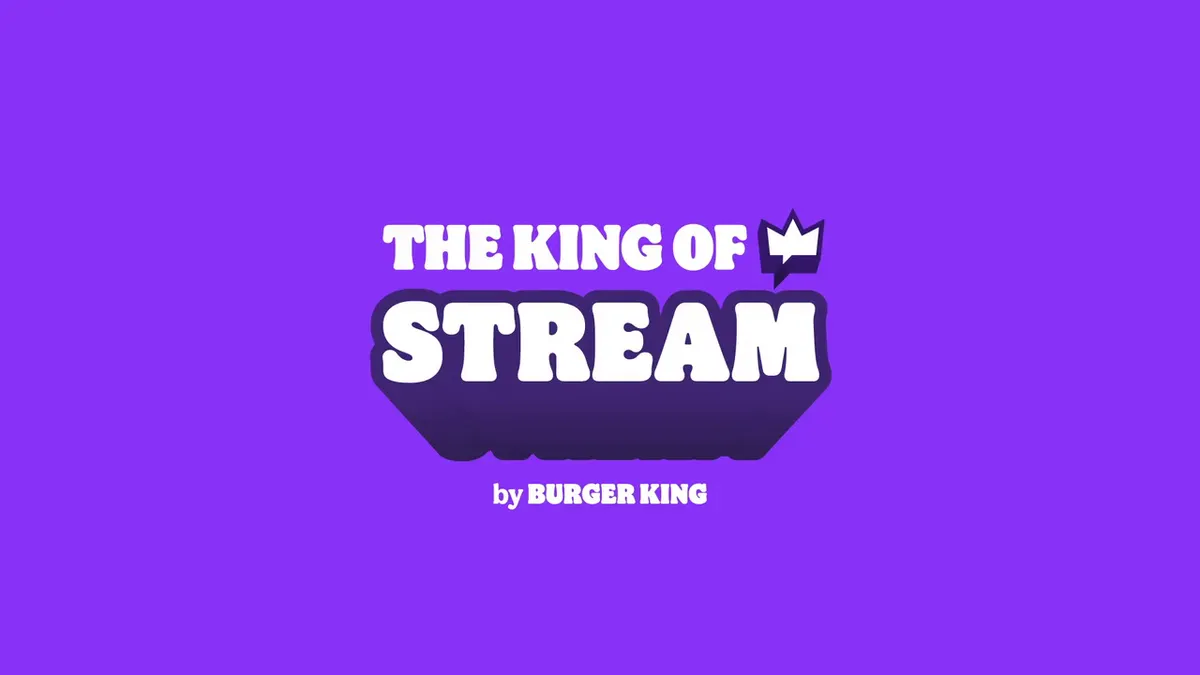Brief:
- Burger King angered people who create Twitch videos by exploiting a feature that lets streamers collect donations from fans. The campaign ran in July for a few hours, and resurfaced this week after the advertising agency behind the campaign tweeted a video to highlight its work, Ad Age reported.
- David Madrid, an agency owned by WPP's Ogilvy, created the campaign using Twitch's feature that lets viewers type a message and have it read aloud by a computer when they donate money to a streamer. The agency used a bot to donate $5, or the price of a Burger King value meal, to popular streamers whose viewers heard an ad message read aloud. David Madrid also recorded the reactions of streamers and put them in its promotional video.
- Streamers criticized Burger King and Ogilvy for making a nominal $5 donation while using their content to market to viewers, who also responded negatively. Several streamers banned Burger King from their channels, per Ad Age.
Insight:
The backlash against Burger King for its stunt campaign on Twitch highlights how mobile marketers must be mindful of the sensitivities of the platform's creators and growing audience for gaming-related content. Gaming fans are typically receptive to advertising when it is presented in a way that doesn't interfere with their experience or disrupt engagement. Twitch offers an average of more than 90,000 streamer channels at any given time, per Twitchtracker, giving viewers ample choices of what to watch if they lose interest in a livestream.
Title: The King of Stream
— Ogilvy (@Ogilvy) August 18, 2020
Client: Burger King
Team: @weareDAVIDmad
Burger King turned Twitch's donation feature into a marketing campaign.
Check out more #ClientWork, here: https://t.co/F7JV9RUakK pic.twitter.com/KUhtxctwhu
The donation feature in Twitch is designed to incentivize streamers to continue creating content that's appealing to an audience of appreciative fans. It wasn't intended to be exploited by brands like Burger King that paid small sums to broadcast its promotion among Twitch viewers, interfering with the spontaneous interactions that typically occur between streamers and fans. It's understandable that creators feel the burger chain took advantage of their work in building engaged audiences without adequate compensation. Popular streamers like Tyler "Ninja" Blevins and Mike "Shroud" Grzesiek have parlayed their popularity as gaming influencers into lucrative brand sponsorships.
Ross O'Donovan, a streamer with thousands followers to his RubberNinja channel Twitch, described Burger King's stunt campaign as "very scummy" in an interview with the BBC. He was livestreaming when a user with the handle "King of Stream" donated $5, triggering Twitch's bot-read Burger King deals aloud. He said that streamers typically are required to disclose paid sponsorships to viewers, and that partnering with a popular streamer usually costs more than the $5 donation.
Burger King's campaign follows past efforts that push the edge with novel technologies, but also risk backlash from consumers or other companies. In 2017, the chain ran a stunt campaign that included a TV commercial to activate Google Home smart speakers in people's living rooms. The commercial showed an actor saying the wake-up command for Google Home, and asking the question, "OK, Google, what is the Whopper burger?" The TV ad then activated viewers' Google voice assistant to search and read aloud the menu item's ingredients. The search company wasn't consulted on the ad, and apparently thwarted Burger King's effort to activate people's smart speakers once the commercial ran on late-night television, The New York Times reported.
Twitch has continued to grow as a marketing platform for advertisers seeking to reach audiences that are elusive to other media channels like linear TV. Its growing popularity has lured brands like Verizon, which started sponsoring a video game tournament series on the platform.
It's too early to tell whether the negative reaction to Burger King's stunt campaign on Twitch will affect the revenue of parent company Restaurant Brands International, whose sales have suffered during the pandemic. The company's revenue dropped 25% to $1.05 billion in Q2 from a year earlier as restaurants were ordered to close their dining rooms in many regions. Burger King's same-store sales fell 13%, including a 9.9% decline in the U.S., though Restaurant Brands shows signs of improvement as more dining rooms reopen, CNBC reported.












